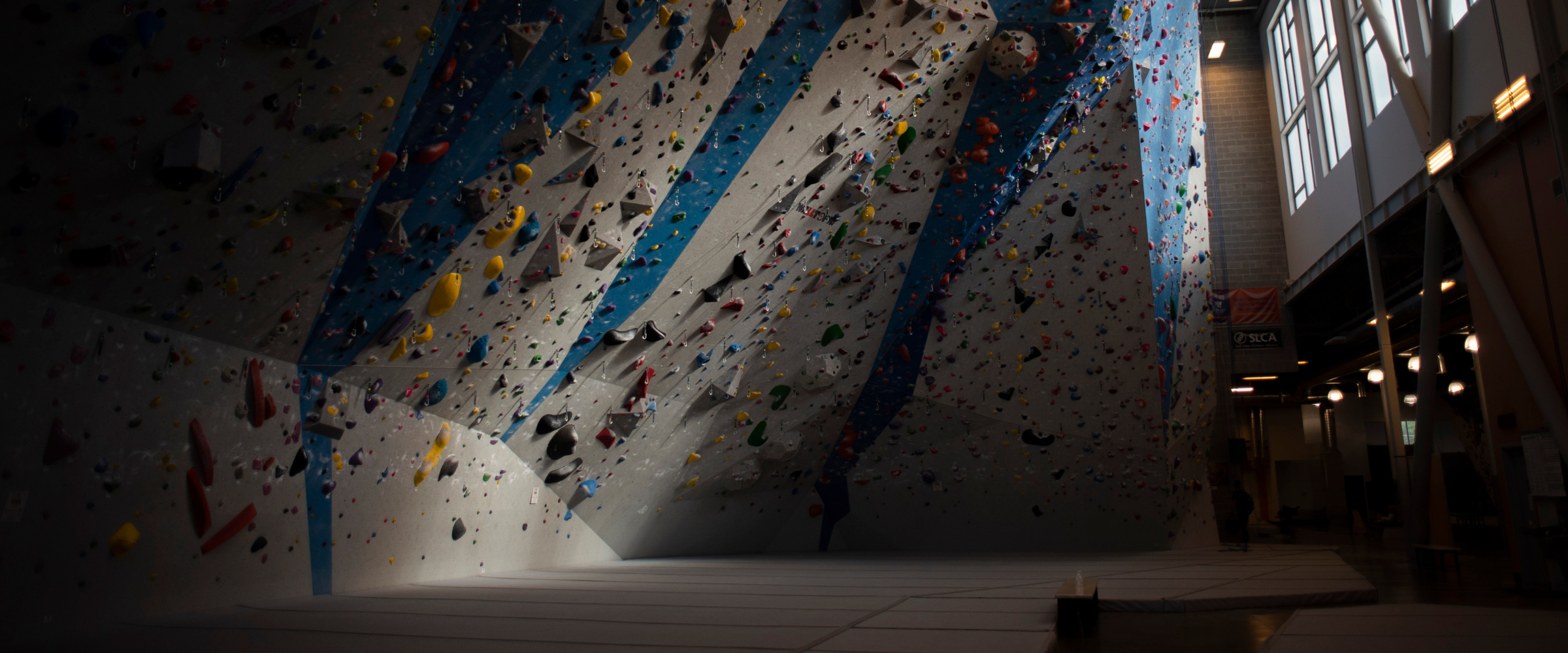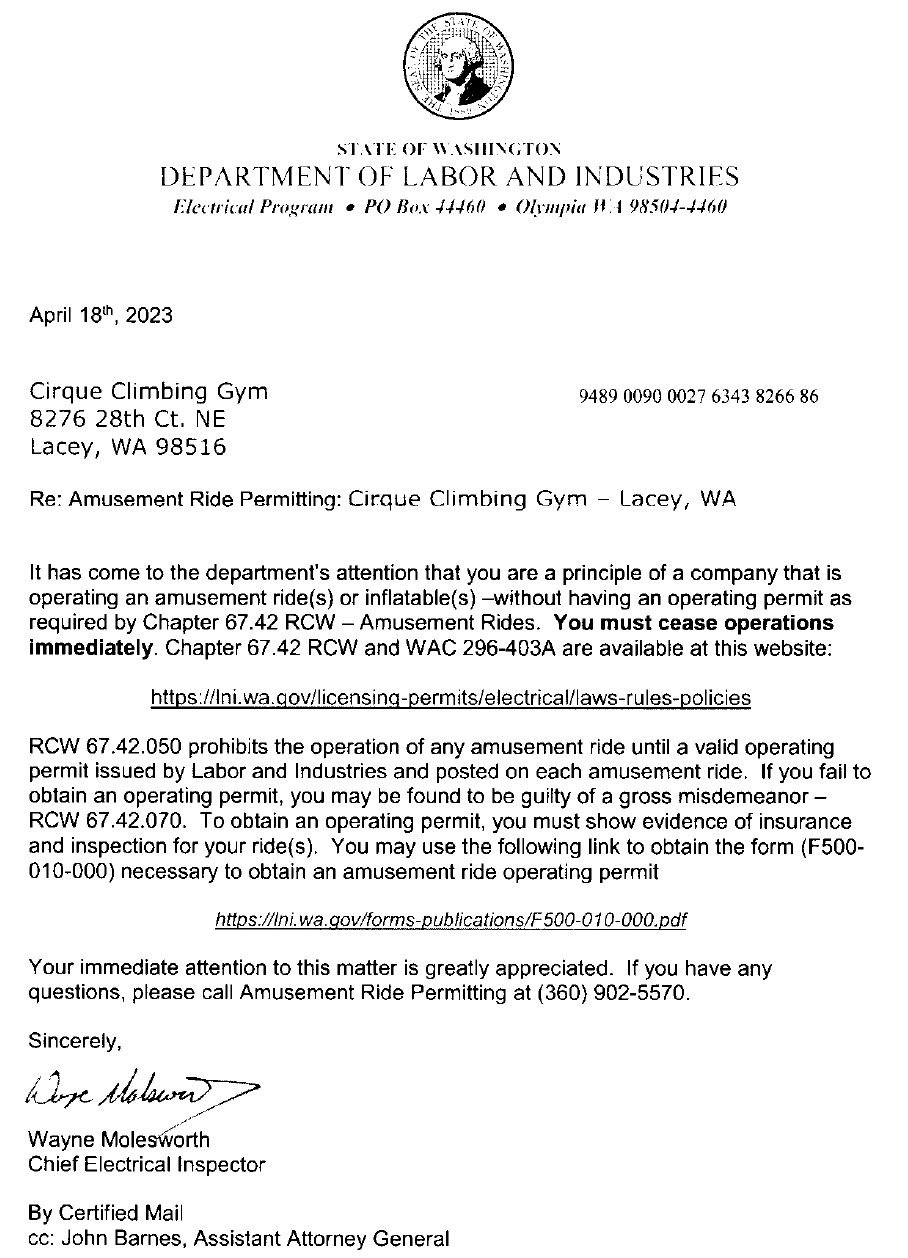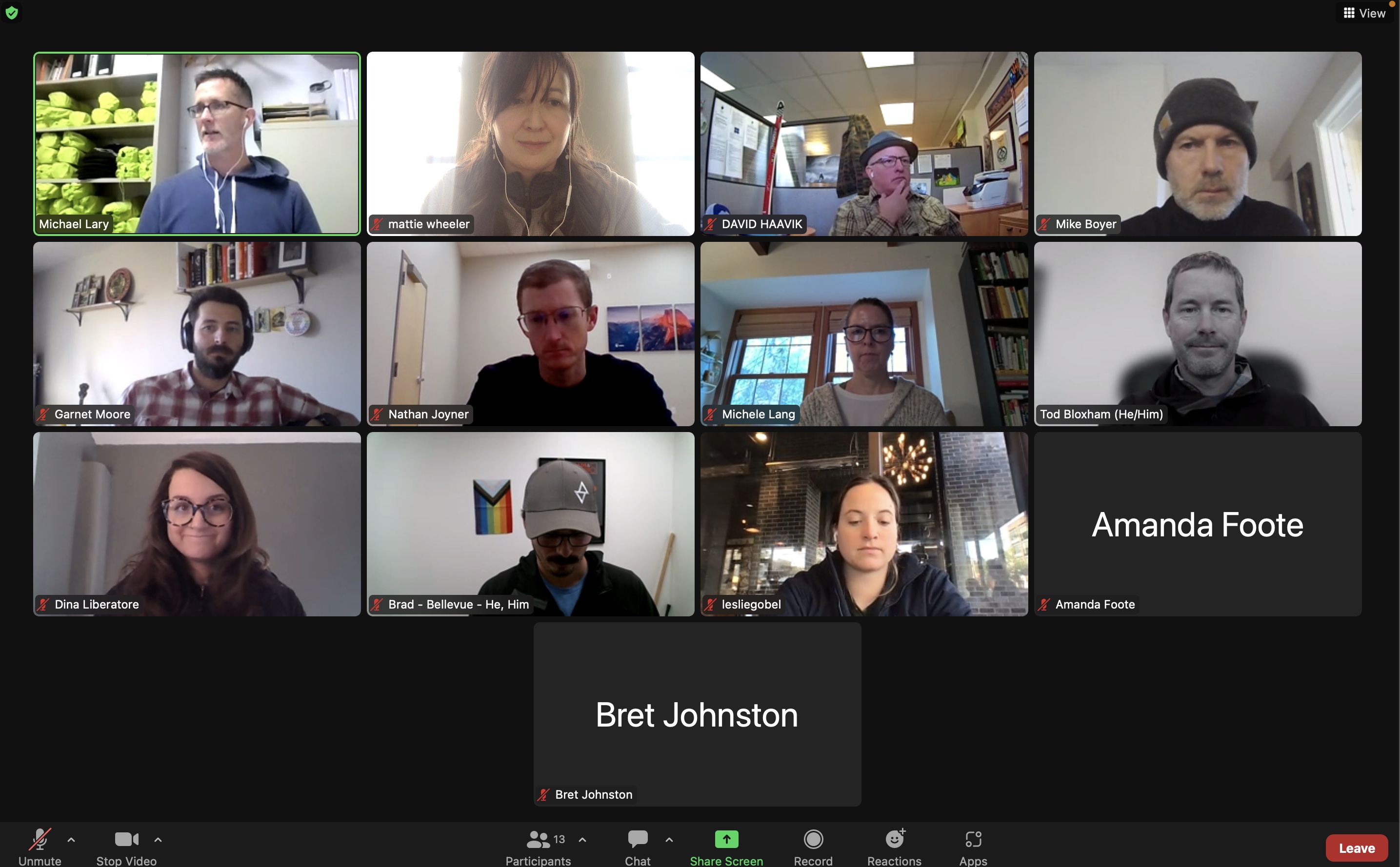Case Study: How to Fight Back Against a Gym Shutdown

You’d like to think that if the time ever came when a government entity decided to shut down your indoor climbing gym, you’d know it was coming. You’d think there would be some communication, some due process, notices, or at least some warning.
But for Mike Boyer and his gym, Cirque Climbing in Lacey, Wash., it was a complete surprise of the worst kind.
The Call
Mike was enjoying a weekend away, camping, when his cell phone started to buzz with news that would throw the future of his climbing gym, and the 1,400 members of the Cirque Climbing community, into limbo. His Director of Operations, Esteban Pinto, was frantically reaching out to let him know that the climbing gym had just received a letter, from the Washington State Department of Labor & Industries (L&I) stating that the facility was in violation of amusement park safety rules and was ordered to cease business, immediately.

“There was no contact with the L&I,” says Mike. “Nobody had reached out; we just got the letter to cease operations. To go directly to that action, without a clear violation, or a chance to have a discussion with an inspector and show them our climbing gym, it just came out of nowhere.”
Once he was able to digest the news, Mike quickly buckled down to find out more information, which was not easy.
“The first step was to say, ‘We are going to find out what this means,’ but it was not easy. We called the number on the listed violation, but no one ever answered. We left a voicemail, but never received a call back.”
Like most gym owners or operators in this situation, Mike was initially left feeling lost and alone, but fortunately, he was soon able to rally, largely thanks to the connection and support of the climbing community at the local, state, and national levels.
First Steps to Fighting Back Against a Closure
The first step was to gather information, and thanks to the proximity of Lacey to the state capital in Olympia, many of the most active members of the Cirque gym were members of the Attorney General’s office or had similar roles in the government, so they were able to pick up the phone or literally walk across the hall to get some information.
Next, Mike reached out to the Washington Indoor Climbing Coalition (WICC), the organization that advances the interests of member gyms by representing indoor climbing as a professional industry in Washington State, and where Mike is a founding member and serves on the board. Immediately he received support and guidance from those on the board through conversations and emergency meetings.
Upon hearing about Mike’s issue from WICC, the CWA immediately got involved to offer our support. WICC has been working closely with the CWA since late 2022 to refine the draft legislation based on similar successful efforts in Ohio and Tennessee. Mike greatly credits the CWA with helping his legal efforts to fight back against the notice to cease business.
The CWA's Role In Helping You Stay Open
“Garnet Moore and Bob Angell (the CWA legal counsel) got involved and provided a great response to support our efforts,” says Mike.
“Our attorneys were starting from scratch, but to have the CWA statement, which was so informational and argued why gyms should not be under the same standards as an amusement park, was so important. Having all those years of experience fighting orders like this, it was really, really, really good guidance.”
Using these tools and connections together allowed Mike and Cirque to get its message heard by some legislators, who soon started making some calls to find out why a local business was being shut down unexpectedly. This soon led to the notice being recalled, ending the imminent threat.
“Once someone from the legislature calls a state agency, that really gets their attention,” says Mike, but he added that it was not just any one action that solved his situation. “There is research that shows that if you can use four or more influencers to share your message, you are able to impact the outcome ten times as much.”
While the Cirque story is one that is technically a win for Mike and the indoor climbing industry, it certainly still comes at a cost. Mike estimates it will cost “a few thousand dollars,” at least, plus around 30-40 hours of work.
“We are not a huge gym, so every dollar matters. Plus, we lost a lot of time and energy drafting letters, and making phone calls, which would have been even more without the support of WICC and the CWA.”
And the emotional cost of facing closure is more pronounced, even if the gym was able to remain operational the entire time.
“I never intended to shut down, I was never going to voluntarily shut my doors,” says Mike. “But I kept thinking ‘What would it mean to have our gym, or any gym, close?’ Imagine how many jobs are lost, how many climbers lose their place to climb, their friends, their connections with their fellow climbers.”
“A thing that is so unique about indoor climbing is that we are part of the climbing community, and when you take away a gym, you take away that community that means so much, and you leave a big hole.”
Something that worries Mike, along with WICC and the CWA, is the fear that a situation like this could happen to another climbing gym, perhaps one that was less connected or able to fight back.
Additionally, there is the lingering concern that a government entity, like the L&I, could revisit this decision or decide to impose their own rules and regulations on the indoor climbing industry, creating an overbearing or prohibitive environment for climbing gym success.
Stronger Together: Legislation in Action
This is why the CWA is supporting WICC with its advocacy efforts in the state of Washington to pass the Climb Better Bill, which will recognize and regulate rock climbing in a climbing facility as a sport with inherent risks that are managed by both the climbing facility operators and the participants
WICC is looking to hire lobbyists to recruit sponsors and co-sponsors to help lobby with the Washington state legislators to introduce the Climb Better Bill for the 2023-24 legislative session, to advocate for the bill and gather support.
While this effort is specific to the state of Washington, Mike is quick to point out how these efforts are vital for all members of the climbing community, setting a precedent that can be used by organizations in other states and provides an opportunity for our industry to own the messaging.
“Everybody in the climbing industry needs to consider supporting this bill and the efforts of WICC,” says Mike. “It is still not clear if the L&I are even the right organization to regulate our industry, as we aren’t amusement parks, but if we don’t provide regulation and pass bills like this, someone else is going to start.”

To hire lobbyists, WICC is raising funds from sponsors, partners, and donations, estimating that it will need to secure at least $100,000 to complete a successful campaign.
“Washington is uniquely positioned to pursue this legislation because of the infrastructure we've developed with WICC,” says Michele Lang, Vice-Chairperson for WICC and CEO of Insight Climbing and Movement in Bainbridge Island, Wash.
“Supporting WICC now has great potential to benefit the industry nationwide by allowing WICC to model the legislation, refine the talking points within our member network, then share everything we learn with other gyms who want to protect indoor climbing in their state.”
What Can I Do?
Learn more about WICC and the Climb Better Bill and how to pledge your financial support to this vital cause. Help set a precedent that climbing gyms across the country can leverage!
The CWA will continue to provide updates on the progress of the Climb Better Bill and the WICC fundraising efforts. Those interested can continue to visit the WICC website for additional updates and more information.
“The CWA can’t stress enough the importance of organizing at the state, provincial, or even local level to protect the interests of climbing facilities and the sport of climbing in general,” says Bob Angell, CWA legal counsel.
“The successful effort in Washington to oppose inappropriate government action shows what can be accomplished through a swift and coordinated response.”
About the Author

Matt Pucak is the Manager of Communications & Member Engagement for the Climbing Wall Association. He has 20+ years of experience working in the recreation and sports industries, with a focus on marketing, event management, and social media. His passion lies in sharing member stories and creating meaningful and mutually beneficial relationships.
Matt grew up in Colorado and has a passion for any sport or competitive activity and is learning to reacclimate to the climbing wall after participating as a youth. Matt lives in Denver with his wife Mimi, infant daughter Eva, and pup Luna.
